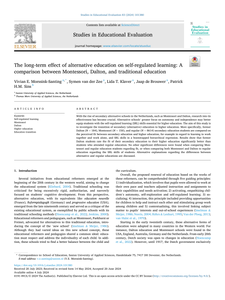Morssink-Santing, V. E., van der Zee, S., Klaver, L. T., de Brouwer, J., andamp; Sins, P. H. (2024). The long-term effect of alternative education on self-regulated learning: A comparison between Montessori, Dalton, and traditional education. Studies in Educational Evaluation, 83, 101380. https://doi.org/10.1016/j.stueduc.2024.101380
MULTIFILE

Innovation is crucial for higher education to ensure high-quality curricula that address the changing needs of students, labor markets, and society as a whole. Substantial amounts of resources and enthusiasm are devoted to innovations, but often they do not yield the desired changes. This may be due to unworkable goals, too much complexity, and a lack of resources to institutionalize the innovation. In many cases, innovations end up being less sustainable than expected or hoped for. In the long term, the disappointing revenues of innovations hamper the ability of higher education to remain future proof. Against the background of this need to increase the success of educational innovations, our colleague Klaartje van Genugten has explored the literature on innovations to reveal mechanisms that contribute to the sustainability of innovations. Her findings are synthesized in this report. They are particularly meaningful for directors of education programs, curriculum committees, educational consultants, and policy makers, who are generally in charge of defining the scope and set up of innovations. Her report offers a comprehensive view and provides food for thought on how we can strive for future-proof and sustainable innovations. I therefore recommend reading this report.
DOCUMENT

Currently, various higher education (HE) institutes develop flexible curricula for various reasons, including promoting accessibility of HE, the societal need for more self-regulated professionals who engage in life-long learning, and the desire to increase motivation of students. Increasing flexibility in curricula allows students to choose for example what they learn, when they learn, how they learn, where they learn, and/or with whom. However, HE institutes raise the question of what preferences and needs different stakeholders have with regard to flexibility, so that suitable choices can be made in the design of policies, curricula, and student support programs. In this workshop, we focus on student preferences and share recent insights from research on HE students' preferences regarding flexible education. Moreover, we use participants’ expertise to identify new (research) questions to further explore what students’ needs imply for several domains, namely curriculum-design, student support that is provided by educators/staff, policy, management, and the professional field. Firstly, a conceptual framework on flexible education and student’s preferences will be presented. Secondly, participants reflect in groups on student personas. Then, discussion groups have a Delphi-based discussion to collect new ideas for research. Finally, participants share the outcomes on a ‘willing wall’ and a ‘wailing wall’.
MULTIFILE

Over the past decade, the maker movement and in its slipstream maker education have attained worldwide popularity among educators, politicians, and the media. Makers’ enthusiasm for creative design and construction, using old and new tools has proven contagious, and is worth exploration and critical reflection by the community of engineering and technology education (ETE). This chapter describes what has been said about “making” by philosophers and educators; what maker education is, and what is new and not so new about it; why it has gained momentum; what the evidence is about its effectiveness and its possible weaknesses; and how mainstream technology education may benefit from maker education. This chapter concludes with ideas for a research agenda.
LINK
Website van het programma Smart Education van de Faculteit Onderwijs en Opvoeding dat zich richt op het ontwikkelen en verspreiden van kennis en expertise over de effectieve inzet van de mogelijkheden van ICT in het onderwijs.
LINK
Dit Trendrapport Open Education 2014 beschrijft de trends op het gebied van open education in binnen- en buitenland, geschreven vanuit de context van het Nederlandse hoger onderwijs. Dat gebeurt aan de hand van acht artikelen van Nederlandse experts op het gebied van open en online onderwijs en acht korte intermezzo’s.
DOCUMENT

In 2020 hebben drie docentonderzoekers (Irene de Kleyn, Mariska Dinkelman en Marleen IJzerman) vanuit het lectoraat Meertaligheid en Onderwijs een inventarisatieonderzoek opgezet en uitgevoerd onder een representatieve afvaardiging van lerarenopleiders en studenten van de internationale varianten van de lerarenopleidingen Duits, Engels, Frans en Spaans van Instituut Archimedes (IA) die zijn gebundeld onder “Teacher Education” (TeacherEd). Het onderzoek had als doel inzicht te krijgen in de rol/plek van meertaligheid als leermiddel, leerdoel en context in de verschillende curricula van de TeacherEd.
DOCUMENT

This dissertation aims to strengthen socioscientific issues (SSI) education by focusing on the resources available to students. SSI education is a type of science and citizenship education that supports students’ informed and critical engagement with social issues that have scientific or technological dimensions. This dissertation explores students’ SSI-related resources relevant to their engagement with SSI, such as their attitudes and social resources. The dissertation consists of four papers. The first is a position paper that introduces the concept of socioscientific capital and argues why it is important to pay attention to students’ resources in SSI-based teaching. The other three papers involve empirical, quantitative studies. Two questionnaires were developed that were used to investigate student differences regarding engagement with SSI: the Pupils’ Attitudes towards Socioscientific Issues (PASSI) questionnaire and the Use of Sources of Knowledge (USK) questionnaire. The final study is an exploration of the effects of SSI-based teaching on students’ attitudes toward SSI, considering socioscientific capital.
MULTIFILE
Het onderzoeksprogramma Smart Education van de Faculteit Onderwijs en Opvoeding richt zich op het ontwikkelen en verspreiden van kennis en expertise over de effectieve inzet van de mogelijkheden van Kunstmatige Intelligentie in het onderwijs.
MULTIFILE